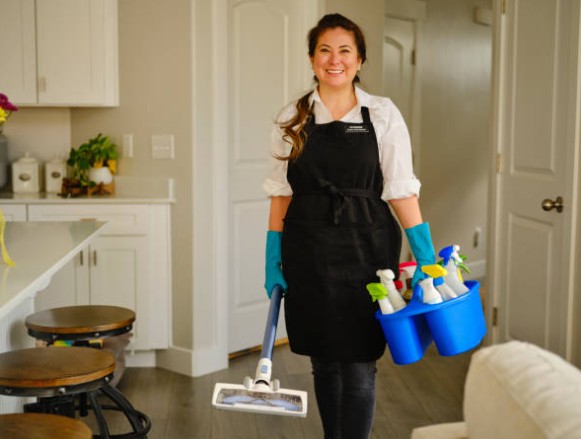When I first started working as a self-employed cleaner in the UK, one of the most important—and frankly, confusing—things I had to figure out was how much to charge. Pricing isn’t just about matching the going rate. It’s about understanding my business costs, the value I provide, and how I want to grow. Setting the right self-employed cleaner hourly rate in UK is essential not only to survive but to thrive.
In this guide, I’ll share everything I’ve learned about pricing my services fairly and confidently while giving you practical examples, market comparisons, and tips that worked for me.
What’s the Average Hourly Rate for a Self-Employed Cleaner in the UK?
Across the UK, self-employed cleaners usually charge between £12 and £18 per hour for standard domestic cleaning. In more competitive or urban areas like London or Brighton, rates can go as high as £20 to £25 per hour, especially if the cleaner provides their own equipment and products.
For more intensive tasks such as deep cleans, end-of-tenancy cleans, or commercial jobs, I often charge more. These services take more time, energy, and materials, so the higher rate is justified.
Here’s a breakdown of what I’ve observed from my own experience and industry insights:
| Service Type | Typical Hourly Rate (UK) | Details |
|---|---|---|
| Standard Domestic Cleaning | £12 – £18 | Weekly/biweekly, general upkeep |
| Deep Cleaning | £18 – £25 | More time-consuming, includes detailed work |
| End-of-Tenancy Cleaning | £20 – £30 (Flat or Hourly) | Often priced as a full job, 3–6 hours typical |
| Office/Commercial Cleaning | £15 – £22 | May require early/late hours and contracts |
This gives you a benchmark, but it’s important to understand that your rate should reflect more than just averages. It needs to work for you, based on your location, services, and costs.
How Do I Decide What to Charge?

When I was just starting out, I had to balance two things: being competitive in the market and covering my actual business costs. Charging too little meant barely making ends meet. Charging too much risked scaring off new clients. To find that sweet spot, I started with a few key steps.
First, I researched what other self-employed cleaners in my area were charging. I checked community forums, cleaner directories, and even chatted with other local professionals. Then, I factored in my own outgoings—everything from travel to insurance—and figured out how many hours I needed to work each week to make a sustainable income.
The process helped me feel confident in setting my rate, knowing it wasn’t just plucked from thin air.
What Affects the Hourly Rate for a Cleaner in the UK?
Several factors impact what I charge for a cleaning job, and I regularly review these to make sure my pricing stays fair and sustainable.
1. Location
Living in or near a big city like London, Edinburgh or Bristol allows for higher rates due to demand and cost of living. In rural areas or smaller towns, I’ve found that clients are more price-sensitive, so I adjust accordingly.
2. Type of Cleaning Job
Routine cleaning, such as weekly housekeeping, tends to have lower rates than more complex tasks. Deep cleans, end-of-tenancy work, and post-renovation cleans all demand higher fees.
3. Experience and Trust
Over time, as I’ve built a reputation and gained loyal clients, I’ve found it easier to charge higher rates. Trust matters in this line of work. Clients are happy to pay more for reliability, punctuality, and attention to detail.
4. Supplies and Equipment

If I’m supplying my own products—especially eco-friendly or brand-specific ones—I charge slightly more. Clients are usually fine with this when they understand what’s included.
Domestic vs Commercial Cleaning Rates: How Do They Compare?
While most of my work has been in domestic cleaning, I’ve also taken on commercial contracts. They can offer steady work but come with different expectations and responsibilities.
Here’s how they compare:
| Cleaning Type | Rate Range | Key Differences |
|---|---|---|
| Domestic Cleaning | £12 – £18/hr | More flexible, one-on-one with clients |
| Commercial Cleaning | £15 – £22/hr | Fixed contracts, stricter routines, and often off-peak hours |
Both types can be profitable, but commercial cleaning often requires more formal proposals, insurance documentation, and occasionally more advanced equipment.
My Monthly Expenses as a Self-Employed Cleaner
When you’re setting your rate, it’s not just about what you want to earn—it’s also about what you need to cover. I had to calculate my business costs to ensure I wasn’t just working to pay bills without any real profit.
Here’s a simplified look at what my monthly expenses can look like:
| Expense | Estimated Cost (Monthly) | Notes |
|---|---|---|
| Cleaning Supplies | £30 – £50 | Products, gloves, cloths, sponges |
| Travel (Fuel/Transport) | £40 – £80 | Depends on the area covered and the type of transport |
| Public Liability Insurance | £10 – £15 | Essential for legal protection |
| Equipment Maintenance | £10 – £20 | Hoover filters, mop heads, small repairs |
| Miscellaneous (Uniform, Admin) | £10 – £20 | Uniforms, advertising, client records, mobile use |
These figures can vary, but they give a good idea of the hidden costs behind every hour worked.
Working for an Agency vs Going Fully Independent
Early on, I worked briefly with a cleaning agency. They found the clients, scheduled jobs, and handled admin—but they also took a significant cut of my earnings. While the agency charged clients £16 to £18 per hour, I only received about £10 to £11, which barely covered my travel and supplies.
Going independent gave me more control. I could charge what I felt my work was worth, build direct relationships with clients, and structure my week around my availability. It also gave me the chance to grow my own brand, get referrals, and secure regular jobs without relying on a middleman.
However, independence also means doing your own marketing, admin, and chasing late payments. For me, the benefits outweigh the drawbacks, but it’s a personal decision based on your confidence and comfort level with running a business.
What Are My Legal Responsibilities as a Self-Employed Cleaner in the UK?

Once I began earning over £1,000 a year, I had to register as a sole trader with HMRC. It’s straightforward and can be done online. After registering, I was responsible for submitting an annual self-assessment tax return, which tracks both my income and expenses.
One of the biggest advantages of being self-employed is that I can deduct allowable expenses—like supplies, travel, and even part of my mobile phone bill. This means I only pay tax on the actual profit I make, not the total money I bring in.
To stay on top of things, I keep simple records in a spreadsheet and set aside 20–25% of my income each month for tax purposes. This way, there are no surprises when tax season rolls around.
Is Being a Self-Employed Cleaner in the UK Worth It?
In my experience, yes—absolutely. While it takes effort, time, and planning, being self-employed has given me flexibility, independence, and better-earning potential than agency work ever did. I’ve built long-term relationships with clients, gained word-of-mouth referrals, and had the freedom to shape my schedule.
The key to success is understanding the market, being clear on your expenses, and setting a realistic and fair hourly rate. If you take the time to get your pricing right, not only will your business be sustainable—you’ll also enjoy the work more knowing you’re getting paid what you deserve.
If you’re a new cleaner trying to set your prices or someone thinking of switching from agency work to freelancing, I hope this guide gives you a clearer picture of how to structure your rates in the UK. The self-employed cleaner hourly rate in the UK isn’t set in stone—but with the right knowledge, you can find a number that works for you, your clients, and your goals.






